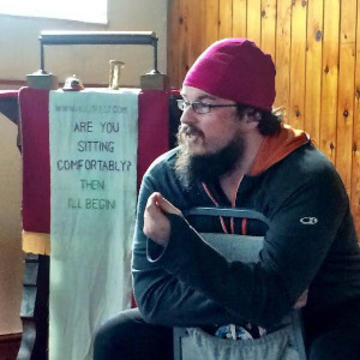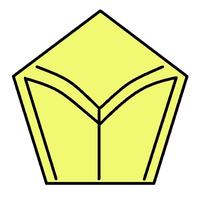Dan Holloway, founder of Mycelium

Dan Holloway works in the University’s administration by day. Dan is the 2016 and 2017 Creative Thinking World Champion, a novelist and performance poet, a leading figure in the self-publishing world, and a long-time campaigner on issues relating to mental health, especially debt and mental health.
Mycelium is a creative thinking training tool and game that draws upon Dan’s academic research into early modern thought systems as well as 20 years of experience as a competitive creative thinker, and a lifetime spent trying to find ways to use his talents after traditional doors were closed to him following a breakdown during his doctoral study. It is aimed particularly at enabling companies and institutions working on the “wicked problems” of the 21st century to adapt the knowledge and expertise of the traditional fields they come from so they are in a position to face the challenges and exploit the opportunities of a rapidly changing landscape.
My background is why I realised I had to become an entrepreneur. My CV shows that I have a first degree and a Masters, that I have been World Intelligence Champion, the first two time Creative Thinking World Champion, that I have performed poetry at the Royal Albert Hall, have lectured in the Ashmolean on the relation between Aphex Twin and mediaeval torture instruments, spoken in parliament about debt and mental health, delivered Oxford’s Disability Lecture, had a regular Guardian column about digital publishing, run 100 kilometre ultramarathons, was listed by mashable as one of the world’s most innovative writers, and despite having a disability that makes socialising pretty much impossible, I seem to be able to network my way into knowing leading figures in finance, publishing, sport, technology, academia and government.
But it also shows that I had a breakdown, which led to debts that mean I could not afford to retrain, or take an internship, and was pretty much shoehorned into administration in order to keep a roof over my head and care for my disabled spouse. And as an administrator, every avenue that I had assumed I could pursue to use my talents to make the world a better place was closed off to me – it is as though the words on my contract say to the powers that be “nothing worth considering here.”
And yet, I felt, surely having some world titles in skills people apparently want (46% of CEOs of S&P 500 companies say the skill they most need this century is creativity – yet apparently they only want to hire you if you demonstrate that through a piece of paper – which lack of creative thinking I guess is why they feel the need so badly!!) meant I should be doing something, *could* be doing something to make the world better, to help us face the unprecedented global challenges of the coming decades. That, combined with a desire to make the world a better place that I feel in an almost physical way, , for many years caused me frustration, and even anger at an institution (Oxford University) that would not let me do this. And so, despite my caring duties, my full time job and my own mental ill health, I decided I had no choice but to devote any minutes remaining in the day to trying to change the world from outside existing structures. It boiled down to a simple problem I posed myself – “If I’m that creative, I should be able to find a way to do this.” And it was in answer to that challenge that Mycelium was born. I am still figuring out whether I can sustain the 100 hour weeks I need to put in to be an entrepreneur on top of everything else – giving the other stuff up isn’t an option yet, but what I do know is that if I don’t try to change the world by being an entrepreneur, I will leave the world a worse place than I found it not a better one, and that’s something I will work myself into the ground to avoid happening.

As a writer, I am used to hearing the mantra “show, don’t tell”. It’s easy to write it off as being really trite, but it is actually true in so many situations, many of which lie far outside the writing world. For me one of its best applications is to entrepreneurship. When we look at the world it is very easy to see the myriad ways people and organisations do things wrong (or, if you want to be polite, sub-optimally). It is important in many cases to tell the world what it is doing wrong – that is what much activism is. But for me, entrepreneurship is about showing the world what it is doing wrong – by being the one who does it right.
I have been trying to understand creativity for at least 20 years, since I won the bronze medal at the first Creative Thinking World Championship in 1997. But in terms of the actual idea for Mycelium – in my day job I was asked to circulate an email to our academics asking them to enter the Humanities Innovation Challenge in May 2017. The deadline was a few days away. I had a look at the entry terms and there seemed to be nothing to exclude members of admin staff. It was the first time I’d come across that kind of openness, and figured it might be the last, so I wondered if I might have an idea that would fit the brief. Mycelium sort of spilled out ready formed.
Orneriness. I have always been stubborn and a contrarian, and felt a pathological hatred of rules I couldn’t understand. The world of traditional institutions is full of such rules and I guess most people just accept them. I have never been able to do that, and I bitterly resent every second I am made to spend on busywork when I should be changing the world. In my day job (and all my day jobs) this gets me into constant trouble. It’s really weird that in entrepreneurship it seems to be helpful!
Curiosity. Read everything. Press all of the buttons “just to see”. Innovation comes from linking things together in new ways, but in order to do that better you need to know lots of things. Plus, curiosity is the surest way to guarantee you keep on with deep practice throughout your life.
A vision of what the world should look like. You are an entrepreneur because you see that the world should be different, and you see that you are the person who can make it different in that way. That means you need a vision of what that difference should be. For me it’s simple – I want to see a world in which everyone is empowered to use every skill they have, without barrier, to improve things.
From that flows everything else – for me some of that is about activism (open access, basic income) and some is my place as an entrepreneur – giving people skills.
The things that I’ve spent 45 years getting in trouble for suddenly turn out to be things that are useful. It is a world in which I don’t have to pretend to believe in rules I think are ridiculous.
Alex Honnold, the climber who free solo climbed El Capitan in Yosemite, who lives out of a van and donates everything he earns to the Honnold Foundation.
I would talk with him about ways we can change the world through inspiration, how we can make people believe they are capable of doing remarkable and beautiful things by doing them in our own lives and empowering them to do them in theirs.
I have made too many mistakes to list, but I would say this. Everyone uses themselves as a benchmark, and that can be a massive mistake. I spent all my life believing, deep down, that whatever I might have achieved I had nothing to offer the world – that my titles and achievements were solely down to luck. I believed this because all I can ever know is myself, and that means if I can do something I assumed everyone could. It turns out that apparently I can do some things other people can’t – and that some of those things might be useful to the world. It is important to find, and listen to, perspectives outside of your own and listen when they tell you that you have something to offer.
I received some funding as a result of winning the Oxford University Humanities Innovation Challenge, and am currently working with Oxford University Innovation Limited.
See above.
There are enough tolerant and accepting people that you won’t be written off if you have weird ideas.
Hang out in the Albion Beatnik bookshop long enough and every interesting person in Oxfordshire will eventually cross your path.
“You ought always to be asking yourself all the time what is the most important thing I could be working on right now? If you’re not doing it why aren’t you?” (Aaron Swartz)
Share this
More news



